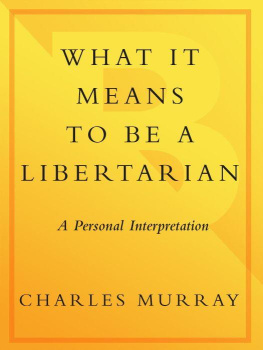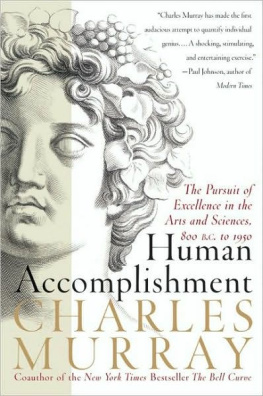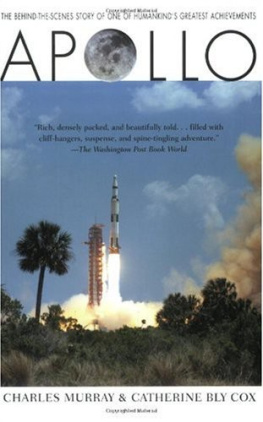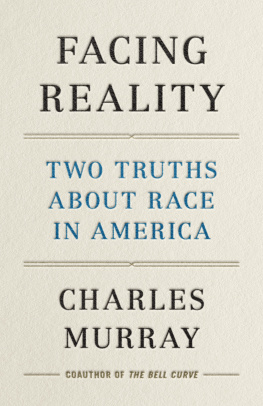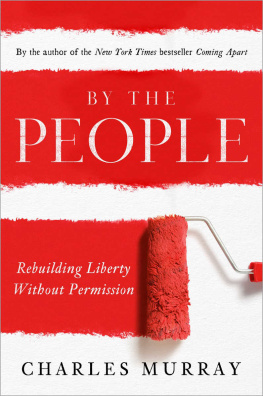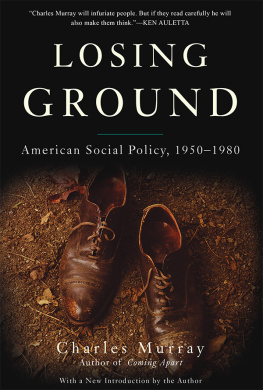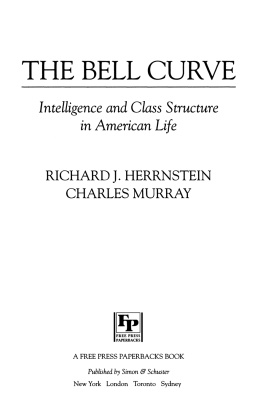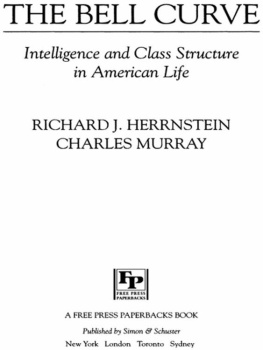In Our Hands
In Our Hands
A Plan to Replace the Welfare State
Charles Murray
REVISED AND UPDATED EDITION
THE AEI PRESS
Publisher for the American Enterprise Institute
WASHINGTON, DC
Distributed to the Trade by National Book Network, 15200 NBN Way, Blue Ridge Summit, PA 17214. To order call toll free 1-800-462-6420 or 1-717-794-3800. For all other inquiries please contact the AEI Press, 1789 Massachusetts Ave., NW, Washington, DC 20036 or call 1-800-862-5801.
ISBN-13: 978-1-4422-6071-9 (paperback)
ISBN-10: 1-4422-6071-8 (paperback)
ISBN-13: 978-1-4422-6072-6 (ebook)
ISBN-10: 1-4422-6072-6 (ebook)
2016 by the American Enterprise Institute for Public Policy Research, Washington, DC. All rights reserved. No part of this publication may be used or reproduced in any manner whatsoever without permission in writing from the American Enterprise Institute except in the case of brief quotations embodied in news articles, critical articles, or reviews. The views expressed in the publications of the American Enterprise Institute are those of the authors and do not necessarily reflect the views of the staff, advisory panels, officers, or trustees of AEI.
Printed in the United States of America
Contents
List of Illustrations
FIGURES
2-1 Costs of the UBI and the Current System, 20002020
2-2 The Persistence of the Underlying Trend in Transfers to Individuals
4-1 45-Year Compound Average Growth Rate for the Stock Market, 18712014
12-1 Per Capita GD Pin 2014 Dollars
A-1 State and Local Transfer Payments, 20002013
B-1 State and Local Transfer Payments, 20002013
TABLES
A-1 Federal Transfer Payments to Be Eliminated
A-2 Federal Transfer Payments to Favored Groups
Ground Rules
An old joke has three men stuck at the bottom of a hole, each presenting his plan to escape. I have forgotten who the first two are, but the third is an economist. When his turn comes he begins by saying, First, we assume a ladder.
This book puts me in the position of the economist. The ladder I will be describing to you would work if it existed, but todays American politicians will not build it. I must ask you to suspend disbelief and play along.
My part of the bargain is to be realistic about everything else, presenting evidence that the policy is financially feasible and would produce the desirable results I claimnot in a utopia, but in the United States of the twenty-first century.
Preface to the 2016 Edition
The original version of In Our Hands published in 2006 predicted that the costs of the existing system and my plan for a universal basic income would cross in 2011. I was two years off, thanks to the Great Recession and the stimulus spending that followed. By 2015, the crossover point had been passed for six years. Discarding the welfare state in favor of a universal basic income is no longer something that would be economically feasible in Americas future. It is economically feasible right now.
Three other considerations prompted me to restate In Our Hands case. First, the rising costs of entitlement programs require that something be donenot in the distant future, but within the next few administrationsto prevent a fiscal crisis. This reality makes my solution more politically feasible now than it was a decade ago. Second, the increasing breakdown of the American working class that I described a few years ago in Coming Apart adds new urgency to changes in policy that would resuscitate Americas civic culture. I believe a universal basic income has unique potential for doing so. The third reason was on the distant horizon when I wrote In Our Hands but is now looming: Advances in technology are not just automating millions of manual jobs, but will soon be displacing millions of white-collar workers. In the decades ahead, a life well-lived will often have to be one that does not involve a job traditionally defined. A universal basic income will be an essential part of the transition to a world unlike any in the history of our species.
Initially, I intended to do no more than replace the old numbers with new ones. But doing so wasnt possible. Since 2006, the way that the federal government reports budget figures has changed, trend lines for budget projections have changed, and inflation required me to increase the size of the guaranteed grant. The arithmetic for In Our Hands had to be redone from scratch.
The text of In Our Hands also changed far more than I anticipated. Apparently there is no such thing as prose a decade old that I dont want to fiddle with. Most obviously, I have discarded The Plan as the label for my solutiona label I was never happy withand replaced it with UBI, standing for universal basic income. In some cases, intervening events required changes in the presentationthe Affordable Care Acts effect on the chapter on health care is an example. Other changes are cosmetic ones intended to make the text more accessible or engaging. In a few instances, I hope that 10 years of mulling over these issues enabled me to elaborate or tighten an argument. But my guiding principles in 2006 remain unchanged, and so does In Our Hands message.
Charles Murray
Burkittsville, Maryland
March 19, 2016
Introduction
A Short Statement of the Argument
America is wealthy beyond the imagining of earlier generations. Every year, the American government redistributes more than $2 trillion of that wealth to provide for retirement, health care, and the alleviation of poverty. We still have millions of people without comfortable retirements, without adequate health care, and living in poverty. Only a government can spend so much money so ineffectually. The solution is to give the money to the people.
A Longer Statement of the Argument
The European and American welfare states evolved under the twin assumptions that resources were scarce and that government could allocate them effectively.
The first assumption was true during the first half of the twentieth century, in this sense: No country had ever been so rich that its wealth, divided evenly among everyone, would provide everyone with a comfortable living. After World War II, in a few countries, wealth increased so much that there was enough money to go arounda landmark event in human history. It was technically possible for no one to be poor. Much of the energy behind the social turmoil of the 1960s was fueled by this revolutionary change.
Enter the second of the assumptions, that governments could allocate resources effectively. During the early decades of the welfare state, it seemed simple. The indigent elderly depend on charity, so let the government provide everyone with a guaranteed pension. The unemployed husband and father cannot find a job, so let the government give him useful work to do and pay him for it. Some people who are sick cannot afford to go to a private physician, so let the government pay for health care.
It turned out not to be simple after all. The act of giving pensions increased the probability that people reached old age needing them. Governments had a hard time finding useful work for unemployed people and were ineffectual employers even when they did. The demand for medical care outstripped the supply. But, despite the complications, these were the easy tasks. Scandinavia and the Netherlandssmall, ethnically homogeneous societies, with traditions of work, thrift, neighborliness, and social consensusdid them best.
Traditions decay when the reality facing the new generation changes. The habit of thrift decays if there is no penalty for not saving. The work ethic decays if there is no penalty for not working. Neighborliness decays when neighbors are no longer needed. Social consensus decays with immigration. Even the easy tasks became hard as time went on.


